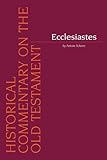Ecclesiastes /by Antoon Schoors.
Material type: TextLanguage: English, Hebrew Series: Publication details: Leuven : Walpole, Massachusetts : (c)2013.; Peeters, (c)2013.Description: lxvi, 856 pages ; 24 cmContent type:
TextLanguage: English, Hebrew Series: Publication details: Leuven : Walpole, Massachusetts : (c)2013.; Peeters, (c)2013.Description: lxvi, 856 pages ; 24 cmContent type: - text
- unmediated
- volume
- 9042929405
- 9789042929401
- BS1475 .E235 2013
- BS1475
- COPYRIGHT NOT covered - Click this link to request copyright permission:
- COPYRIGHT NOT covered - Click this link to request copyright permission: https://lib.ciu.edu/copyright-request-form
| Item type | Current library | Call number | Vol info | Status | Date due | Barcode | |
|---|---|---|---|---|---|---|---|
| Reference (Library Use ONLY) | G. Allen Fleece Library COMMENTARY | BS1475.H578 (Browse shelf(Opens below)) | ECCL | Available | 31923002035752 |
Browsing G. Allen Fleece Library shelves, Shelving location: COMMENTARY Close shelf browser (Hides shelf browser)
"Ecclesiastes, Qoheleth in Hebrew, is a fascinating book. It was written in the Hellenistic Period (3rd-2nd Cent. B.C.) and is one of the latest books in the Old Testament. The author is in search of an answer to the problem he poses in 1:3, 'What profit is there for humans from all their toil at which they toil under the sun?' The answer is: 'None'. Therefore, Ecclesiastes begins and ends his book with a statement that everything is absurd. He does not try to explain away this reality, but he presents enjoyment of life as the best, though not perfect, solution. He has been called an atheist, a pessimist, a sceptic, an Epicurean, but also an optimist, a believing or god-fearing man. He is certainly a nonconformist, and the best characterization is that he is a sceptic or even an agnostic, who undermines all sorts of certainties. He asks many questions but gives few answers. But all this is meant for the best: he speaks honestly with a feeling of compassion with tormented humankind. His book often sounds very modern."--Publisher description.
COPYRIGHT NOT covered - Click this link to request copyright permission:
COPYRIGHT NOT covered - Click this link to request copyright permission:
There are no comments on this title.





